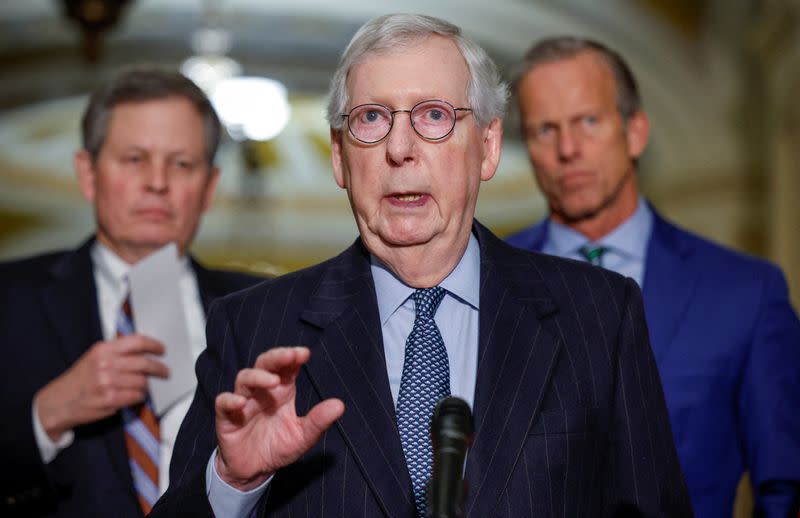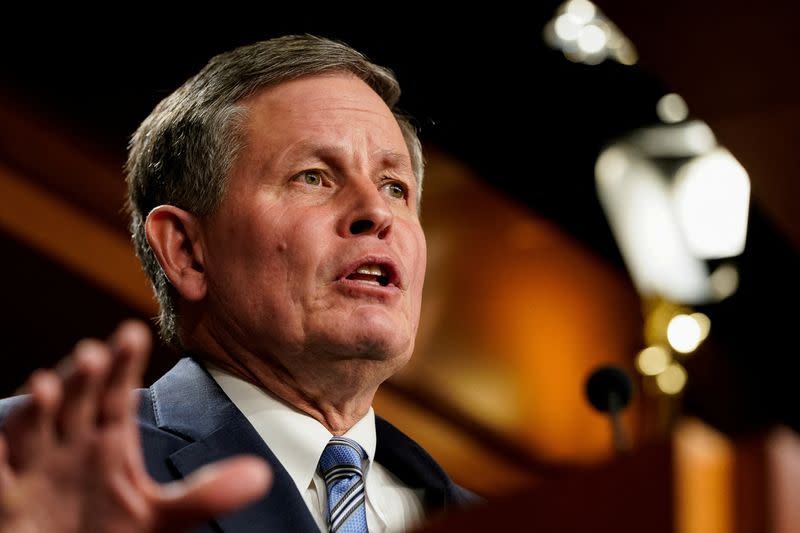Pennsylvania next on Republican 2024 US Senate campaign wish-list
- Oops!Something went wrong.Please try again later.
- Oops!Something went wrong.Please try again later.
- Oops!Something went wrong.Please try again later.
- Oops!Something went wrong.Please try again later.
By David Morgan and Jarrett Renshaw
WASHINGTON (Reuters) - Top U.S. Senate Republicans are moving to try to line up high-quality candidates for next year's elections after untested candidates with fringe views cost them seats in 2022, with Pennsylvania next on their wish list.
Senator Steve Daines, who chairs the Senate Republican campaign arm, already has endorsed candidates in three states where the party hopes to unseat vulnerable Democratic incumbents in 2024: Montana, West Virginia and, earlier this week, Nevada.
In Pennsylvania, Daines looks poised to endorse Republican former hedge fund executive David McCormick, who could announce his candidacy later this year. McCormick last year narrowly lost a Republican Senate primary to celebrity physician Mehmet Oz, a friend of former President Donald Trump who went on to lose the general election to Democratic Senator John Fetterman.
McCormick is expected to launch a Senate campaign in autumn, according to two sources familiar with his planning, though they cautioned that he had not yet made a final decision.
"I'm very pleased to see Dave give this serious consideration. He's got to get in the race first. But I think Dave would be a great candidate," Daines, who represents Montana in the Senate, told Reuters.
"I want to see candidates that can win not only a primary election, but importantly can win a general election and appeal to independent voters," Daines added. "David McCormick would fit that profile."
The strategy marks a departure from 2022, when the National Republican Senatorial Committee took a hands-off approach in party primaries. That saddled Republicans with nominees who had little political experience but were loyal to Trump and often ready to echo his false claims of widespread voter fraud in the 2020 presidential election.
The result was a 51-49 Senate Democratic majority that has provided President Joe Biden with a firewall against efforts by the Republican-led House of Representatives to dismantle his agenda.
"In 2022, we lost in Arizona, Georgia and New Hampshire. It underscored that a high-quality candidate is crucial," Senate Republican leader Mitch McConnell said in an interview.
"They have to be able to win in November or they go home. You can't depend on the base alone to win in states like Montana, West Virginia and Ohio," McConnell added.
Thirty-four of the 100 U.S. Senate seats will be up for grabs next year. Independent election analysts forecast that Democrats are defending seats in eight competitive states - Arizona, Michigan, Montana, Nevada, Ohio, Pennsylvania, West Virginia and Wisconsin - while Republicans are defending no seats in states regarded as competitive.
THE TRUMP EFFECT
One complicating factor for the Republican strategy is that 2024 will be a presidential election year, with Trump currently leading the crowded fieldof Republican candidates for the party's nomination to face Biden, who is seeking re-election. That may mean Senate hopefuls will have to face questions about Trump's words and actions on a daily basis.
In the 2022 congressional elections, Trump backed controversial Senate candidates including Oz in Pennsylvania and former football star Herschel Walker in Georgia, who both lost to Democrats. Had Republican candidates prevailed in those races, the party would have emerged with a Senate majority.
Senate Democrats are hoping to see similar dynamics in the battleground states of 2024.
"I'm confident you're likely to get folks who are out of step with the majority of people in those states," said Senator Gary Peters, who oversees campaign strategy for Senate Democrats.
A Trump spokesperson did not respond to Reuters queries seeking comment on the former president's plans for any role in the Senate races.
Trump is already a factor in Pennsylvania, where McCormick had early reservations about running due to the possibility of having Trump at the top of the ticket, the sources said. Trump personally attacked McCormick during the race, and McCormick advisers fear Trump could ultimately be a drag at the polls.
"What it would mean to have Trump at the top of the ticket has been at the forefront of his mind. But he knows there's a path to winning with or without Trump at the top of the ticket," one source familiar with McCormick's thinking said, speaking on condition of anonymity.
Trump holds a commanding lead over his rivals for the Republican presidential nomination, according to a Reuters/Ipsos poll that showed his support at 49% compared to 21% for his closest rival, Florida Governor Ron DeSantis.
So far, Daines has endorsed Republicans Tim Sheehy in Montana, Sam Bowman in Nevada and Republican Governor Jim Justice in West Virginia.
Sheehy, aiming to unseat Democratic Senator Jon Tester, is a former Navy SEAL who founded the aerial firefighting company Bridger Aerospace.
"He's got a great resume. This guy's like a rock star," Senator John Thune, the chamber's No. 2 Republican, told reporters. "It would be nice if we could clear the field there."
Sheehy could face primary opposition from U.S. Representative Matt Rosendale, a Trump ally and member of the hardline House Freedom Caucus. Rosendale opposed Tester for the Senate in 2018 and lost.
(Reporting by David Morgan in Washington and reporting by Jarrett Renshaw in Philadelphia; Editing by Will Dunham and Scott Malone)


